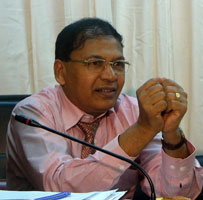Climate change is simply the greatest collective challenge we face as a human family," United Nations Secretary General Ban Ki Moon said recently emphasizing the importance of the forthcoming Copenhagen climate change summit. The world is talking about Copenhagen and an important climate deal, but what really can we expect from it?
In 1997 world leaders gathered in Kyoto, Japan and signed the first climate deal to reduce emissions. Thirty-nine developed countries identified as Annexure I countries were given mandatory limits to which they should reduce their Green House Gas (GHG) emissions. But key industrial countries, the USA, Canada and Australia among them, who jointly emit nearly 36% of the world’s Green House Gases did not sign the Kyoto Protocol, casting doubts on its effectiveness.
The Kyoto Protocol expires in 2012. Agreeing on a viable mechanism to control emission of Green House Gases for the period after 2012 is on the agenda of the Copenhagen summit. “We need to understand that what is going to be discussed in Copenhagen is mainly political and economical.
Scientists’ debate on climate change is much over with IPCC’s 4th assessment report pointing out that climate change is truly happening,” says Prof. Mohan Munasinghe, Vice Chairman of the UN’s climate change agency- the Intergovernmental Panel on Climate Change (IPCC) which shared the 2007 Nobel Peace prize for its efforts in promoting understanding of the climate change phenomena.
Setting up emission cuts for each country is the ultimate aim of the Copenhagen gathering. But there is already a rift between developed countries and emerging economies such as India and China.
The Kyoto Protocol did not set any mandatory emission cuts for these developing countries in 1997, but the developed countries now want all countries to share the burden. However, cutting down emission means that either developing countries need to reduce their energy-consuming manufacturing or start using clean but expensive energy. The lobby led by India and China sees this as a denial of their right to develop, considering developed countries reached that status after emitting billions of tons of GHG in the past which is still accumulated in the atmosphere contributing to global warming. This has caused a deadlock in climate talks in recent months.
The Copenhagen summit begins on December 7 and will go on until the 18th. The first week will be dedicated to discussions between negotiators from each country who are yet to arrive at an agreement. What will be Sri Lanka’s official position in this important round of talks?“We will participate in the Copenhagen climate talks as an independent nation,” says Minister of Environment and Natural Resources, Patali Champika Ranawaka, whose ministry will represent Sri Lanka at the negotiations. However, Sri Lanka’s stance would be mostly in line with the Small Island Developing States (SIDS) Group that comprises a distinct group of developing low-lying coastal countries. These countries are vulnerable to climate change, even though their contribution to global green house gas emissions is minimal.
Sri Lanka has a 1700 km sea front and taken together with the islands in the north, this increases to 2400 km. So the predicted sea level rise would affect Sri Lanka too.
Sri Lanka’s suggestions that will be tabled at Copenhagen cover many aspects. The country wants to make the Adaptation Fund created under the Kyoto Protocol more active with adequate financial commitments from developed nations. Sri Lanka believes adequate, predictable and sustained level of financial resources on a grant basis and technology transfer for adaptation and mitigation is essential for developing countries to survive climate catastrophes and their effects.
For example it is expected that Sri Lanka’s dry zone where most of the paddy cultivation is done will be worst hit by climate change as the region will get drier. Extreme weather events too will disturb farming, making climate change a socio-economic crisis coupled with poverty. Finding new hybrids of paddy that will survive changing climate may require technological support from other countries.
 |
| Dr. Sumathipala |
The Lankan delegates will table the suggestion for technological and financial support for enhancing the capacities to adapt to the adverse effects of climate change at Copenhagen. Sri Lanka will also suggest that the 37 developed countries identified by the Kyoto Protocol should contribute 1% of their GDP to the Climate Change Adaptation Fund.
Addressing the International Forum of Environmental Journalists held in Colombo a few weeks ago, the Environment Minister revealed Sri Lanka’s position on Green House Gas Emission targets emphasizing that developed countries would have to target 49% cuts by 2020 and at least 85% cuts by 2050.
A few weeks ago, Sri Lanka also became a partner to the UN initiative on Reducing Emissions from Deforestation and Forest Degradation in Developing Countries (REDD) Programme. Sri Lanka is only the 14th country to be enlisted in REDD and our delegates will keep their eye on getting the relevant benefits during the Copenhagen summit.
“The climate talks are complex and tedious. There were several rounds of talks previously but many ended up with differences,”said Dr. W.L. Sumathipala, the key Sri Lankan representative at these climate talks adding that the first few days would be crucial to get out of the deadlock at the negotiating tables.
Dr. Sumathipala is also Director of Climate Change Secretariat established last year aiming at providing a platform to address climate change issues at the national level.
The secretariat is currently preparing the Second Climate Assessment Report for Sri Lanka which is an obligation for countries that are signatories to the Kyoto Protocol. Once published, this report will provide an overview of effects of the impact of climate change in Sri Lanka. |


